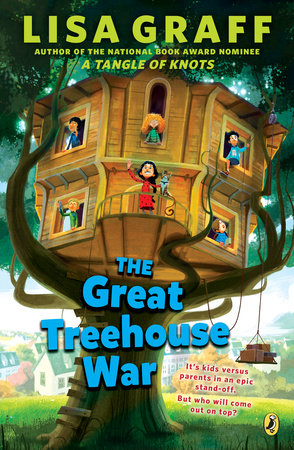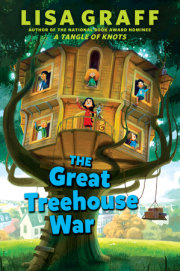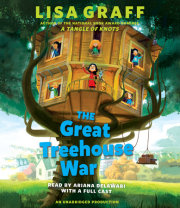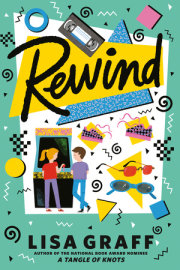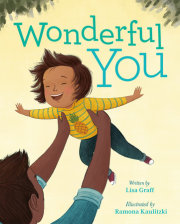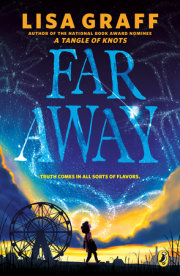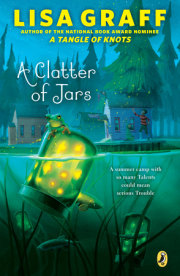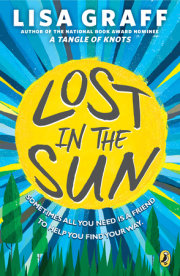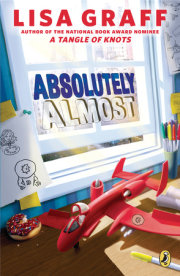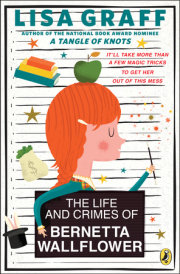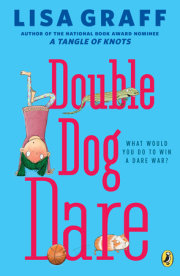The Last Day of Fourth Gradea year before what happened happenedThere are a lot of things you should probably know to understand why a bunch of kids decided to climb up a treehouse and not come down. But to really understand it, you’d have to go way back in time, and peek through the living room window of a girl named Winifred Malladi-Maraj, on her last day of fourth grade. Since time travel isn’t possible, you’ll just have to picture things. So picture this:
After walking home from school, Winnie stepped through the front door, with her backpack over her shoulder. Winnie’s parents were sitting on the living room couch, with their hands in their laps. They were watching the front door, like they’d been waiting for their daughter for a long time.
Winnie pulled off her backpack and dropped it in the doorway. Buttons, who is the world’s greatest cat, wove his way between Winnie’s legs, like he knew she was about to need snuggling. “Mom?” Winnie said, squinting her eyes at her parents on the couch. “Dad?” She could tell right away that something weird was going on.
It’s probably important to know that Winnie’s parents have never been exactly normal. Like, instead of playing board games after dinner, the way some families did, Winnie’s dad—a biologist—might sit her down for a slide show about his latest research on the beneficial properties of bat guano, which only made Winnie wish she’d never eaten dinner at all. Or Winnie’s mom—a mathematician—might try to explain her current work on the Conway’s thrackle conjecture, which only made Winnie wish she’d never grown ears.
(Once, Winnie made the mistake of asking if she and her parents could play Boggle after dinner, and afterward she’d had to sit through a two-hour presentation of all of her parents’ many awards and grants—none of which, they informed Winnie, had been won playing Boggle—and a four-hour argument about whether or not Winnie’s dad had more awards than Winnie’s mom because there were simply more prizes for biologists than there were for mathematicians.)
(Winnie never asked about Boggle again.)
But finding her parents waiting for her on the couch together seemed especially weird to Winnie. Because, normally, Winnie’s parents weren’t even home when she got out of school. Normally, Winnie started her homework all by herself and then heated water on the stove exactly at 5:55 p.m., so the pot would be boiling and ready to put pasta in as soon as they got home. (Winnie’s parents were very precise about mealtimes.)
(They were very precise about a lot of stuff.)
Another weird thing Winnie noticed that afternoon was the way her parents were sitting. While she was standing in the doorway with Buttons weaving between her legs, she realized that she hadn’t ever seen both of her parents on the same couch before. When they watched television or sat with guests, Winnie’s mom usually squished herself against one couch arm, while her dad sat in the recliner on the far side of the room.
“What’s going on?” Winnie asked. Even Buttons let out a confused
mew?“Come sit down,” Winnie’s mom replied, patting the couch cushion between herself and Winnie’s dad.
“Yes,” Winnie’s dad agreed. (That was another weird thing, Winnie noticed. Her parents
never agreed.) “Have a seat. We marked a spot for you.”
And that was the weirdest thing of all. There was a tiny X of masking tape stuck to the center of the middle couch cushion. Her parents, Winnie realized as she stepped closer, had measured out a spot for her, so that she’d be sitting exactly evenly between them—not one millimeter closer to one than the other.
But Winnie, who was pretty used to her parents being weird, decided there was nothing to do but sit. Buttons sat, too, hopping right into her lap.
“Winifred,” her mom said. She cleared her throat. “Your father and I—”
“Oh no,” Winnie’s dad cut in, putting up a hand to stop Winnie’s mom. “We agreed I would tell her. You got to tell Winifred about the tooth fairy.”
Winnie’s mom frowned. “I don’t see how that’s pertinent, Varun. This is an entirely different—”
“We discussed this,” Winnie’s dad argued. “But once again, you’re attempting to ruin—”
While Winnie’s parents argued, Buttons purred a little louder in Winnie’s lap, scrunching his head under her hand. Winnie scratched and scratched at Buttons’s soft orange fur, while her parents argued and argued. Winnie watched her mom, so angry with her dad. She watched her dad, so furious with her mom. Her parents might have been acting weird, Winnie realized, but the fighting, that was completely normal.
And when she realized that, Winnie knew, deep in her gut, precisely why her parents had sat her down on that tiny X of masking tape.
“You guys are getting a divorce, aren’t you?” she asked them.
Her parents stopped fighting at once. They turned, both together, and they stared at her.
“That’s the thing you were going to tell me, right?” Winnie said.
“Yes,” Winnie’s mom said, putting a hand on Winnie’s knee. “But don’t worry. We have a very sensible plan for how to divide your time equally between the two of us.”
Winnie’s dad put a hand on Winnie’s other knee. “Exactly evenly,” he told her.
For the next half an hour, Winnie sat precisely between her two parents, with one of their hands on each of her knees, as they explained their very sensible plan for her future.
They’d found an unusual street, they told Winnie, a “real gold mine,” called Circle Road, just one block over from Winnie’s uncle Huck’s house.
Winnie scratched a little harder at Buttons’s neck.
Circle Road, Winnie’s parents explained, looped around on itself in a tiny circle, so that there was just enough space for two houses.
Winnie stroked Buttons’s soft belly.
Winnie’s mom would live in the two-story Colonial on the northernmost end of the circle, and Winnie would stay with her on Sundays, Tuesdays, and Fridays.
Winnie caressed the base of Buttons’s ears, just the way he liked.
Her dad would live on the southernmost side of the street, in the yellow split-level (which might have
seemed smaller than Winnie’s mom’s house, he informed his daughter, but was technically bigger, because of the square footage of the basement). Winnie would stay with him on Mondays, Thursdays, and Saturdays.
Winnie rubbed under Buttons’s orange chin.
Both houses had sprawling backyards, they went on, which backed up onto each other.
Winnie nestled her cheek in the soft fur at the base of Buttons’s neck.
And at the exact center of Circle Road, her parents said, smack in between the two houses—and definitely
not (they’d checked) on either parent’s property—was an enormous linden tree, with thick branches that reached in all directions. That’s where Winnie would stay on Wednesdays.
Winnie must’ve squeezed Buttons a little too tightly then, because he let out an angry
mew!“I’m going to live in a
tree?” Winnie asked her parents. It was the first thing she’d said in thirty minutes.
“Don’t be ridiculous,” her mom said.
“You’ll be in a
treehouse,” her dad clarified. “Your uncle Huck has already agreed to design it.”
Hearing that made Winnie and Buttons feel a little bit better, because Uncle Huck was both an amazing uncle and a fabulous architect. (He was also the one who’d taught Winnie all about Artist Vision, which was something that would definitely come in handy later.) But still . . .
“You really want me to live in a treehouse
every Wednesday?” Winnie asked, glancing from her mom to her dad and back again. “All by myself?”
“It’s the only way to split things evenly,” her dad replied. “Since every week has seven days in it. Seven, you know, is not an even number.”
“Yes,” Winnie’s mom said. “We went over and over it. That’s the only way it works. Three days with your father, three days with me, and one day on your own. Doesn’t that sound like a very sensible plan?”
“Um . . . ,” Winnie began, glancing from her dad to her mom and back again. Buttons wasn’t quite sure how he felt about things, either. “I guess?” she said at last.
“I knew you’d think so,” her dad said with a smile. “It was my idea, after all.”
“
Your idea?” Winnie’s mom cried. “I very much disagree with
that statement, Varun.”
“Oh, do you?” Winnie’s dad said. “What a shock, Alexis, that you feel the need to disagree with me.”
“I’ll disagree with you when you take claim to
my proposals, Varun.”
As her parents continued their argument, Winnie scooped up Buttons and headed down the hallway to her room. Neither of her parents seemed to notice that she’d left. Winnie shut the door on their bickering, thinking that perhaps it wouldn’t be so bad after all, having one day a week to herself.
Copyright © 2018 by Lisa Graff. All rights reserved. No part of this excerpt may be reproduced or reprinted without permission in writing from the publisher.

